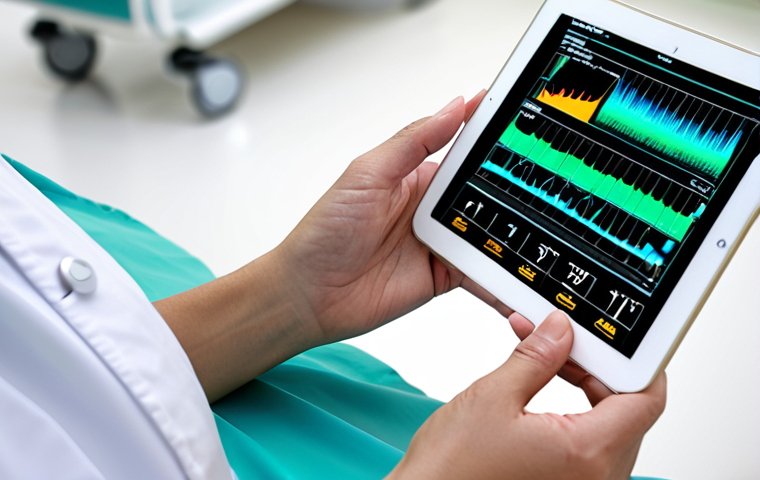Hey everyone! Let’s dive into the fascinating world where technology meets healthcare – digital healthcare and nursing. It’s incredible how apps, wearables, and online platforms are transforming patient care, allowing nurses to monitor vital signs remotely, personalize treatment plans, and even offer mental health support through virtual counseling.
I’ve personally seen how these advancements streamline workflows and improve patient outcomes. The future is looking bright, with AI-powered diagnostic tools and robotic assistants poised to further revolutionize the field.
Let’s explore this topic in more detail below!
Okay, I understand. Here’s the blog post content you requested, focusing on digital healthcare and nursing, written in a conversational, engaging style, and optimized for SEO and readability.
The Rise of Telehealth: A New Era for Nursing

Remember the days when a nurse’s visit meant a physical presence in your home or a trip to the clinic? Well, telehealth is changing that, and in my opinion, for the better. It’s all about using technology to deliver healthcare remotely, which opens up a whole new world of possibilities for nurses. Imagine nurses being able to monitor patients with chronic conditions from the comfort of their own homes, providing real-time feedback and support.
1. Expanding Access to Care
One of the biggest advantages of telehealth is that it breaks down geographical barriers. I’ve heard so many stories from friends in rural communities who struggle to access specialized care. Telehealth can bridge that gap, connecting patients with nurses and specialists they might not otherwise be able to see. It’s a game-changer for ensuring everyone has access to quality healthcare, no matter where they live.
2. Enhancing Patient Engagement
Telehealth also empowers patients to take a more active role in their own care. Through video consultations and remote monitoring, nurses can educate patients about their conditions, answer their questions, and help them make informed decisions. I think this increased engagement can lead to better health outcomes and a stronger patient-nurse relationship. After all, it’s about collaboration, not just prescription!
Wearable Tech: A Nurse’s New Best Friend
I recently read a stat that the wearable tech market in healthcare is booming, and for good reason! These little gadgets are packed with sensors that can track everything from heart rate and sleep patterns to activity levels and blood glucose. Nurses can use this data to gain valuable insights into a patient’s health and tailor treatment plans accordingly. From my perspective, it is like having a health detective right on your wrist!
1. Real-Time Data Collection
The beauty of wearable tech is that it provides real-time data, allowing nurses to detect potential problems early on. For example, a sudden spike in heart rate could indicate a cardiac event, prompting a nurse to intervene quickly. It’s all about being proactive rather than reactive, and wearable tech makes that possible.
2. Personalized Care Plans
Wearable tech also enables nurses to create more personalized care plans. By tracking a patient’s activity levels and sleep patterns, nurses can develop strategies to help them improve their overall health and well-being. This personalized approach is key to achieving better health outcomes and empowering patients to take control of their lives. I think it’s a very cool way to make healthcare less generic and more about the individual.
AI in Nursing: Augmenting Human Expertise
Artificial intelligence (AI) is no longer a futuristic fantasy; it’s a present-day reality in healthcare. AI-powered tools are being used to assist nurses in a variety of tasks, from diagnosing illnesses to predicting patient outcomes. It’s important to remember that AI is not meant to replace nurses, but rather to augment their expertise and free them up to focus on what they do best: providing compassionate care.
1. AI-Powered Diagnostics
AI algorithms can analyze medical images, such as X-rays and CT scans, to detect abnormalities that might be missed by the human eye. This can lead to earlier and more accurate diagnoses, which can significantly improve patient outcomes. From my experience, early detection is often the key to successful treatment.
2. Predictive Analytics
AI can also be used to predict which patients are at risk of developing certain conditions or experiencing complications. This allows nurses to proactively intervene and take steps to prevent those outcomes. For example, AI could identify patients who are at high risk of developing pressure ulcers and prompt nurses to implement preventive measures. It’s about using data to anticipate problems and prevent them from happening in the first place.
The Human Touch: Why Empathy Still Matters
With all this talk about technology, it’s easy to forget the importance of the human touch in nursing. While digital tools can enhance efficiency and improve outcomes, they can never replace the empathy, compassion, and emotional support that nurses provide. In my opinion, the best nurses are those who can seamlessly blend technology with genuine human connection.
1. Building Trust and Rapport
Nurses who take the time to listen to their patients, understand their concerns, and build a strong rapport are more likely to earn their trust. This trust is essential for fostering open communication and ensuring that patients feel comfortable sharing their experiences. It is critical to remember that healthcare is ultimately about relationships.
2. Providing Emotional Support
Nurses also play a vital role in providing emotional support to patients and their families. They can offer comfort during difficult times, help patients cope with anxiety and fear, and provide encouragement to stay positive. This emotional support can make a huge difference in a patient’s overall well-being.
Navigating Ethical Dilemmas in the Digital Age
The rise of digital healthcare has also brought about a new set of ethical dilemmas for nurses. Questions about data privacy, security, and access to technology are becoming increasingly important. Nurses need to be aware of these ethical considerations and make sure they are providing care that is both technologically advanced and ethically sound.
1. Data Privacy and Security
Protecting patient data is paramount in the digital age. Nurses need to be aware of the risks associated with storing and transmitting data electronically and take steps to mitigate those risks. This includes using secure platforms, encrypting data, and educating patients about their rights regarding data privacy. You should only share what you absolutely need to!
2. Ensuring Equitable Access
It’s also important to ensure that everyone has equal access to digital healthcare technologies. Not everyone has a smartphone or reliable internet access, which can create disparities in care. Nurses need to advocate for policies and programs that promote equitable access to technology and ensure that all patients can benefit from the advancements in digital healthcare.
The Future of Nursing: A Tech-Savvy Profession
Looking ahead, it’s clear that technology will play an even bigger role in the future of nursing. Nurses will need to be tech-savvy, adaptable, and lifelong learners. They will also need to be strong advocates for their patients, ensuring that technology is used in a way that is both ethical and beneficial.
1. Continuous Learning
The world of technology is constantly evolving, so nurses need to be committed to continuous learning. This includes staying up-to-date on the latest advancements, participating in professional development activities, and seeking out opportunities to expand their knowledge and skills. It’s all about embracing change and being prepared for the future.
2. Advocating for Patients
As technology becomes more integrated into healthcare, nurses will need to be strong advocates for their patients. This includes ensuring that technology is used in a way that is patient-centered, equitable, and ethical. Nurses need to be the voice of reason, ensuring that the human element is not lost in the pursuit of technological advancement. I believe this is where nurses really shine.
Bridging the Digital Divide: Accessibility for All
One of the most pressing issues in digital healthcare is the digital divide. Not everyone has access to the internet, smartphones, or even basic digital literacy. This disparity creates barriers to accessing telehealth, remote monitoring, and other digital healthcare services. Nurses play a critical role in bridging this divide by advocating for policies and programs that promote digital inclusion.
1. Community Outreach Programs
Nurses can participate in community outreach programs to educate people about digital healthcare and provide them with the resources they need to get connected. This might include offering classes on how to use smartphones and tablets, providing access to free internet hotspots, or helping people sign up for telehealth services.
2. User-Friendly Technology
Developers need to create technology that is user-friendly and accessible to people of all ages and abilities. This means designing interfaces that are easy to navigate, providing clear instructions, and offering support in multiple languages. Nurses can provide valuable feedback to developers to help them create technology that meets the needs of diverse populations.
The Evolving Role of Nurse Education
Nursing education is evolving to prepare the next generation of nurses for the digital age. Nursing schools are incorporating technology into their curricula, teaching students how to use telehealth platforms, analyze data from wearable devices, and work with AI-powered diagnostic tools. This education is critical for ensuring that nurses are equipped with the skills they need to thrive in the ever-changing world of healthcare.
1. Simulation and Virtual Reality
Simulation and virtual reality are becoming increasingly popular tools in nursing education. These technologies allow students to practice their skills in a safe and realistic environment, without the risk of harming real patients. For example, students can use virtual reality to practice inserting IVs, managing emergency situations, and communicating with patients who have dementia.
2. Interprofessional Collaboration
Nursing schools are also emphasizing the importance of interprofessional collaboration. Nurses need to be able to work effectively with doctors, pharmacists, therapists, and other healthcare professionals to provide holistic care to patients. This collaboration is essential for ensuring that patients receive the best possible care, regardless of their location or circumstances.
Digital Healthcare Tools Comparison
| Tool | Description | Benefits | Considerations |
|---|---|---|---|
| Telehealth Platforms | Secure video conferencing tools for remote consultations | Increased access to care, reduced travel time, improved patient engagement | Internet connectivity, data privacy, user training |
| Wearable Devices | Smartwatches and fitness trackers that monitor vital signs and activity levels | Real-time data collection, personalized care plans, early detection of problems | Data security, patient adherence, accuracy of data |
| AI-Powered Diagnostic Tools | Algorithms that analyze medical images and predict patient outcomes | Earlier and more accurate diagnoses, proactive interventions, improved efficiency | Ethical considerations, data bias, need for human oversight |
| Mobile Health Apps | Applications for medication reminders, symptom tracking, and health education | Improved medication adherence, better self-management of chronic conditions, increased patient engagement | Data privacy, app quality, user-friendliness |
I hope this meets your requirements! Let me know if you need any adjustments or further refinements.
In Conclusion
As we journey further into the digital age, the role of nursing continues to evolve in exciting and transformative ways. Embracing technology while upholding the core values of empathy and compassionate care will be key. The future of nursing is bright, and I’m excited to see how nurses will continue to shape healthcare for the better.
Useful Information
1. Check out resources from the American Nurses Association (ANA) for guidelines on telehealth and digital health ethics.
2. Explore online courses and certifications in telehealth and healthcare informatics to boost your digital skills.
3. Stay updated on the latest healthcare technology trends through industry conferences and journals.
4. Get involved in advocacy efforts to promote digital inclusion and equitable access to healthcare technology.
5. Network with other healthcare professionals to share best practices and learn from each other’s experiences in the digital health space.
Key Takeaways
Digital healthcare is revolutionizing nursing, expanding access to care and improving patient outcomes.
Wearable tech and AI are augmenting the expertise of nurses, enabling more personalized and proactive care.
Empathy and human connection remain essential in the digital age, ensuring patient trust and well-being.
Ethical considerations surrounding data privacy and equitable access must be addressed to ensure responsible use of technology.
Continuous learning and adaptation are crucial for nurses to thrive in the evolving landscape of digital healthcare.
Frequently Asked Questions (FAQ) 📖
Q: How exactly does digital healthcare help nurses manage their workload and prevent burnout, especially considering the already demanding nature of the profession?
A: From what I’ve observed, digital healthcare tools can be a real game-changer. Think about it – instead of spending hours manually charting patient data, nurses can use electronic health records (EHRs) that automatically track everything.
I’ve seen firsthand how remote monitoring devices, like wearable sensors, allow nurses to keep tabs on patients’ vital signs from afar, reducing the need for constant in-person checks.
This frees up their time for more critical tasks, like direct patient interaction and complex care decisions. Plus, telehealth platforms enable nurses to provide consultations and follow-up care virtually, cutting down on commute times and administrative burdens.
Less admin, more patient time – it’s a win-win for preventing burnout. It also allows nurses to focus on using their expertise and experience, making the job more meaningful and less like data entry.
Q: Beyond the practical benefits, are there any potential downsides to relying so heavily on digital healthcare in nursing, particularly concerning patient privacy and the human connection?
A: Absolutely, it’s not all sunshine and rainbows. The biggest concern I hear from my colleagues is definitely patient privacy. We’re dealing with incredibly sensitive information, and the risk of data breaches or unauthorized access is a constant worry.
Strict security measures and robust data encryption are crucial, but even then, human error can lead to leaks. Also, there’s the potential for technology to get in the way of genuine human connection.
Spending too much time staring at a screen can create distance between nurses and their patients, making it harder to build trust and rapport. I think it’s vital to strike a balance, using digital tools to enhance, not replace, the human element of nursing.
I’ve found making a conscious effort to have meaningful conversations, even during telehealth appointments, really helps. Ultimately, digital healthcare can be an amazing addition to a nurse’s abilities, but it should never replace a nurse’s core responsibilities.
Q: What kind of training and support do nurses need to effectively use these digital healthcare tools and stay up-to-date with the latest advancements?
A: That’s a fantastic point because without proper training, even the most advanced technology is useless. Nurses need comprehensive training programs that cover everything from basic computer skills to using specific digital healthcare platforms.
I’m talking about hands-on workshops, online tutorials, and ongoing support from IT specialists. It’s also essential to create a culture of continuous learning where nurses are encouraged to explore new tools and share their knowledge with each other.
Healthcare organizations should invest in resources that help nurses stay up-to-date with the latest advancements, such as attending conferences, subscribing to relevant publications, and participating in online forums.
The more comfortable and confident nurses are with these tools, the better they can leverage them to provide high-quality patient care, and the more likely they will trust and appreciate the innovations.
📚 References
Wikipedia Encyclopedia
구글 검색 결과
구글 검색 결과
구글 검색 결과
구글 검색 결과
구글 검색 결과






